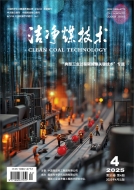Technical and economic analysis and inspiration of a large scaleCCUS−EOR project
 2024 No. 10
2024 No. 10
 895
895 596
596

Citation format:

Authors:
- WANG Gaofeng
- LIAO Guangzhi
- HU Zhanqun
- MA Zhanrong
- ZHENG Da
- ZHANG Long
- FAN Wei
- GUO Xifeng

Unit:
- China Petroleum Research Institute of Petroleum Exploration and Development
- China Petroleum Oil & Gas and New EnergyBranch
- China Petroleum Changqing Oilfield Branch

Abstract:
Under the premise of carbon neutrality, various sectors of society have high expectations for petroleum enterprises to usecarbon for carbon sequestration,but there is insufficient understanding of the economic feasibility of the cross industry,cross regional,and cross departmental large scale full process CCUS−EOR project. CCUS/CCS projects in China have injected over 10 million tons ofcarbon dioxide into geological bodies such as oil reservoirs,accumulating rich project operation experience. Based on the analysis of thecurrent technological status and maturity of various links in China's oil recovery CCUS industry chain,it is technically feasible to orderlycarry out large-scale and full process CCUS projects in the Ordos Basin. Based on the geological characteristics of regional oil reservoirs,aCCUS rolling construction model for complex oil reservoirs was proposed, which involves learning from experience, engineeringconstruction,project operation,understanding the laws of production,and adjusting development plans simultaneously. Subsequently,the coal chemical carbon source and oil reservoir in the Yulin-Ansai-Dingbian area of Shanxi Province were selected and a 3 million tonsCCUS project based on pipeline transportation scheme design and investment estimate were carried out. Using an improved full processCCUS project economic evaluation model,the impact of controllable key variables such as benchmark rate of return,fiscal and financialpolicies, carbon trading prices, and production uncertainty on the economic viability of large-scale CCUS projects was analyzed and evaluated. The critical benefit of wellhead carbon prices for several large-scale CCUS projects was compared. Finally,proposing a unified economic evaluation benchmark and internal rate of return for each link in the industrial chain is helpful for the cooperation of Three Cross CCUS projects. Implementing green low interest loans can reduce the critical benefit oil price of CCUS−EOR projects. Adopting the policy of “only allowing trading of post CCUS projects,only allowing trading of the lower limit of buried inventory,and requiring green compensation for the reduced buried inventory” can solve the carbon trading dispute of CCUS projects. Strictly selecting CO2 flooding test areas can further improve the economic efficiency of projects. The above industrialization development policy recommendations are conducive to promoting the large-scale application of CCUS technology in the Ordos Basin.

Keywords:
- carbon neutrality
- large scale
- full process
- CCUS−EOR
- economic analysis
- industrial policy

Citation format:

Chart:

Articles:

-
Executive director
China Coal Science and Industry Group Co., Ltd
-
Sponsored by
Coal Science Research Institute Co., Ltd
Coal Industry Clean Coal Engineering
Technology Research Center -
Editor in Chief
XIE Qiang
-
Vice Editor-in-Chief
YU Chang
SHI Yixiang
ZHAO Yongchun
DUAN Linbo
CAO Jingpei
ZENG Jie -
Publication Frequencies
Monthly
-
ISSN
1006-6772
-
CN
11-3676/TD
Covered by
- CSTPCD
- RCCSE(A+)
- AJ
- EBSCO host
- Ulrichsweb
- JST
- Scopus
Contact us
New Media
-
 Meichuanmei
Meichuanmei -
 Clean Coal Technology
Clean Coal Technology -
 Online Journals
Online Journals







 Submission system
Submission system Copyright agreement
Copyright agreement Instructions for authors
Instructions for authors